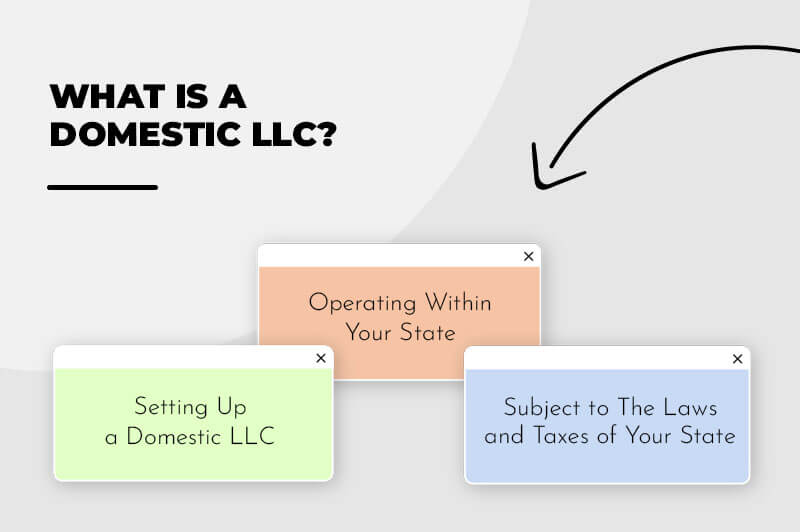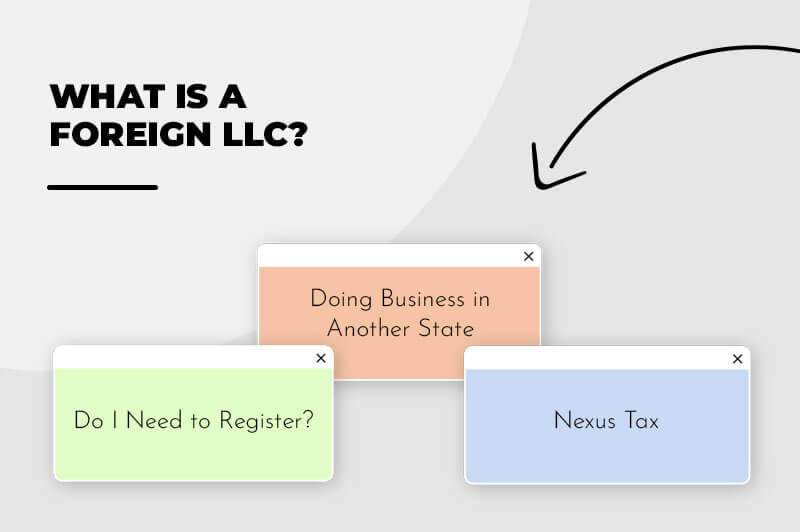
At first, the difference between a domestic LLC and a foreign LLC can be confusing. You need to know what differentiates a domestic LLC from a foreign LLC.
You might be wondering if foreign qualification rules apply to your business? Which states consider you “as doing business in”? And if you’re not seen as a foreign LLC or “doing business in” another state, are you liable for sales tax nexus?
Most U.S. states have their own rules; fortunately, many are the same throughout this great nation. And, when you know what they are, it takes the guesswork out of knowing if and when you must register as a domestic or foreign LLC.

LLC stands for a limited liability company; it’s a business entity you create by filing an article of organization with your Secretary of State. Registering an LLC helps protect your assets in cases of litigation and debt by separating them from those of the business.
Domestic refers to an LLC that only conducts business in the state where it was formed, also known as its home state.
Operating within your state means your LLC only does business within your home state and has no physical presence in another.
For example, suppose you live and form an LLC in Florida and open a coffee shop in your home state only. In that case, your business is considered a domestic LLC operating within your state.
Each of the 50 U.S. states has its own rules and regulations for setting up a domestic LLC, but most require you to take the following steps:
When you create a domestic LLC, you’re subject to all laws and taxation relative to your state. As each state has different regulations for licenses, permits, and taxes, check with your Secretary of State’s office and the Small Business Administration before you trade.

A foreign LLC does business in states other than its home (domestic) state.
States require you to register with them as a foreign LLC to meet their rules and requirements, comply with business standards, and collect and pay taxes.
While you’ll only file articles of incorporation in one state, you can file a foreign LLC entity registration in several.
When considering expansion or doing business in another state, knowing the implications of registering as a foreign LLC, the process, and the business benefits is essential.
You must also ensure you’re legally trading and have adequate protection to avoid any risk of damage to your brand reputation and personal finances.
But first, do you need to register?
You determine whether you must apply for foreign LLC qualification by confirming that your business activities qualify as “doing business in” another state.
There are many factors to consider when determining your eligibility in a state. And as each state you do business in has its own deciding terms and conditions, you need to contact the relevant Secretary of State’s office to confirm which steps you must take.
However, the following questions apply to most states and can help you determine if you are “doing business in” another state and need to register.
Doing business means engaging in business activities outside your home state that are part of your everyday business routine.
You might need to register as a foreign LLC if you answer yes to one or more of the following questions:
There are variations in state rules that determine acceptable activities. For example, one-off transactions and cross-state product sales while running your business from your home state generally don’t qualify you as “doing business in” another state.
However, they could make you liable for sales tax nexus!

Nexus is a sales tax you must collect from buyers and pay to a state where you have a connection that obligates you to that state’s tax system.
No state can enforce sales tax upon you until they prove the connection. And that’s where things get tricky because the various circumstances that could confirm your sales tax nexus obligations vary in all 50 states. Not only that, the rules are constantly updated and open to interpretation by the courts.
One constant that triggers a sales tax nexus is a physical business presence in a state, such as an office, store, or employee. E-commerce, especially Amazon, has made nexus compliance as tricky as a Sunday New York Times crossword puzzle!
For example, if you register an LLC in Florida, sell online, and store products in a warehouse in another state with a sales tax, you might have to collect and pay sales tax on any products sold.
You could also be liable when you don’t have a physical presence but pass a state’s sales and income threshold.
First, establish if the state has a sales tax, then see if the sales tax nexus applies to a business’s total dollar sales volume, transactional sales volume, or both.
Next, determine if your business has passed the threshold. If the answer’s yes, follow these steps:
Most states give themselves ample room to change and interpret the definitions of sales tax laws to benefit themselves. So pay close attention and look at every state closely when confirming your sales tax nexus obligations.
As an LLC business owner, you’re responsible for knowing about and complying with all sales tax obligations in any state where you’re found to be “doing business.”
If you don’t pay sales tax, your business could be liable for uncollected sales tax with interest.
As sales tax awareness is your responsibility, you can’t sell in a state with a sales tax and not collect it or advertise a cheaper product than your competitors because you haven’t included sales tax.
The IRS views all U.S.-formed businesses as domestic, regardless of the state of registration or if they sell in another state. The IRS views any business registered in another country as foreign.
For example, if you register an LLC in the state of Ohio, you’re considered a domestic LLC, regardless of whether you trade in another state.
If you were to register an LLC in the United Kingdom and do business in the U.S. but not register in a U.S. state, you’re a foreign LLC.
However, if you own a U.K. registered LLC, do business in the U.S. and register with a U.S. state, you become a U.S. domestic LLC.
Any domestic LLC owner whose business activities make them liable in another state should set up a foreign LLC because “doing business in” another state and not registering is illegal.
Remember, you’re responsible for knowing all domestic, foreign, doing business in, and sales tax nexus laws. For e-commerce business owners, it’s advisable to seek advice from a registered sales tax nexus accountant in the state you’re doing business in.
For new business owners, the registration, ongoing, and legal costs of working in multiple states and complying with sales tax laws are often too high to make it worthwhile.
It’d be best if you took away from this post that every state has its laws and regulations. Domestic vs. foreign and “doing business in” are relatively constant and determined mainly by a physical presence.
While doing business in and sales tax nexus varies from state to state and is in constant change, you can be found liable simply by selling products and passing a financial threshold.
It pays to do your due diligence before expanding into other states, so before you do, ensure the benefits make it worth your while.
This portion of our website is for informational or educational purposes only. Tailor Brands is not a law firm, and the information on this website does not constitute legal advice. All statements, opinions, recommendations, and conclusions are solely the expression of the author and provided on an as-is basis. Accordingly, Tailor Brands is not responsible for the information and/or its accuracy or completeness. It also does not indicate any affiliation between Tailor Brands and any other brands, services or logos on this page.
Products
Resources
©2025 Copyright Tailor Brands